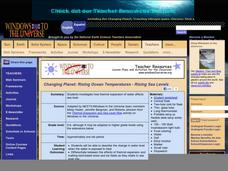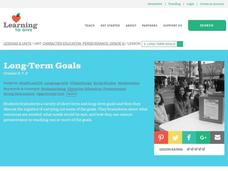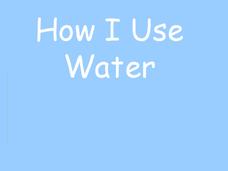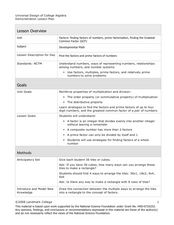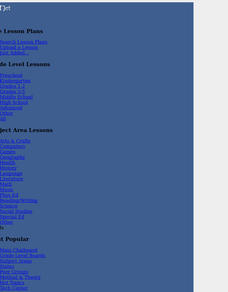Curated OER
WET Science Lesson #5: Pass the Salt Please! (How Road Salt Affects Wetlands)
As an anticipatory set, biologists listen to the story of Ruth Patrick, a scientist who used algae to detect water quality. They observe a demonstration of osmosis and diffusion. In their lab groups, they place Elodea stalks in...
Curated OER
The Importance of Detailed Procedures in Science
Students examine the importance of clear communication in scientific exploration. In pairs, they write clear directions for an everyday activity for their partner to read and follow.
Curated OER
Crash Course in Flight
High school physicists demonstrate Bernoulli's Principle by blowing on different items and finding that they do not move in the expected direction! They apply Bernoulli's equation to the flight of an airplane. This well-organized lesson...
Institute of Electrical and Electronics Engineers
Build a Big Wheel
What does it take to prepare for a construction project? In an engineering lesson, youngsters examine how a Ferris wheel can turn and carry a load without falling apart. After reading up on big wheel designs, they create a model using...
Curated OER
Changing Planet: Rising Ocean Temperatures - Rising Sea Levels
As an anticipatory set, young environmental technicians watch a video about how ocean temperatures seem to be changing along with the global climate. They perform a laboratory demonstration with the purpose of observing what happens to...
Curated OER
Mouse...Mouse...Snake!
Use this activity as an anticipatory set to warm up for a lesson on predator/prey relationships. Pupils will play a round of "Duck, Duck, Goose," substituting the ducks and geese for two animals that have a predator/prey relationship....
Curated OER
Sun and Shadows
Why do shadows look different in the summer than in the winter? What causes day and night? How can a sundial be used to tell time? Answer these questions and more through two engaging lessons about light and shadows. Fourth and fifth...
US Department of Agriculture
Sink or Float?
Will it sink or will it float? Learners predict the outcome as they drop random objects into a container of water. Then, they keep track of the results and record the data in a t-chart to draw a final conclusion.
Curated OER
Long-Term Goals
Middle schoolers set long-term and short-term goals. In this character education lesson, students determine whether goals that they write for themselves are long-term or short-term.
National Geographic
Ocean Exploration
Dora, Dora, Dora, Dora, Dora! This may be your little ones' best guess as to what it's like to be an explorer! Give them a deeper understanding with this compact examination. A four-minute video introduces them to Robert Ballard,...
Curated OER
Changing Planet: Sea Levels Rising
Begin by showing a six-minute video, Changing Planet: Rising Sea Level as an anticipatory set. Pupils draw a topographic map of a potato continent. Finally, they will visit NOAA's sea levels online map and NASA's carbon dioxide...
WK Kellogg Biological Station
Sounds of Selection
Do you want a creative and fun way to teach about natural selection? Hop to it by turning your middle school princes and princesses into frogs trying to catch as many bugs as possible in a Hungry Hungry Hippos style game. For high...
University of Alaska
Clay Model Earth
What a great way to incorporate hands-on learning while teaching about the earth's layers. The class observes an overhead transparency (linked in Included Materials) as they create their own model Earth using different colors of clay....
Curated OER
How I Use Water
Beginning with a brief anticipatory set on how water is commonly used, this presentation evolves into a well planned lesson on the water cycle. Students will discuss vocabulary, label the parts of the water cycle, locate where water is...
Curated OER
The Clark Family Story: Tracing the Cause of Hemophilia
Ms. Strohfeldt did not omit anything when she designed this comprehensive lesson plan on DNA mutation and sex-linked traits. Begin with a pretest as an anticipatory set. Read a case history of the Clark family and the occurrence of...
Curated OER
Acid Rain
Create a simulation of acid rain in your classroom with lemon juice and bean plants to help kids study the effects of pollution on plants. In addition, learners will listen to a story and write responses based on guiding questions.
Aquarium of the Pacific
Lego Molecules
Young scientists construct an understanding of molecular compounds in this hands-on science lesson. Using LEGO® to model the atoms of different elements, students build molecules based on the chemical formulas of common compounds.
Curated OER
The Water Cycle - Main Components
Present the water cycle to your middle schoolers with this lesson plan. After an anticipatory set, they participate in a Q & A session about the terms associated with the water cycle: evaporation, transpiration, condensation, and...
Curated OER
Find the Factors and Prime Factors
Show the class how to find the factors of numbers. They use a variety of strategies, including unifix cubes, to find the factors of a whole number. This resource includes clear procedure to follow. Included are an anticipatory set,...
Institute of Electrical and Electronics Engineers
Shake it up with Seismographs!
Shake things up in your STEM or earth science classroom when you have small groups construct their own seismographs. A reading assignment on the history of seismographs, the Richter scale, and current technology sets the stage for the...
Curated OER
Get the Drift?
The anticipatory set is clever: give groups five minutes to work on the puzzle and then discuss what strategies they used to match the few that connected. This introduces middle schoolers to the concept of continental drift. A portion of...
Curated OER
Student Earth Day Pledge Slips
Writing prompts are great because you can usually find one for any holiday or event. Have your class help the Lorax in his quest to spread the word about Earth Day and environmental awareness with a short printable prompt. The page...
Curated OER
Making Twins
A short reading is accompanied by a quiz in a resource describing the differences between identical and fraternal twins. The quiz is mostly true/false and would make an excellent anticipatory set to get kids thinking about what they know...
Curated OER
The Scientific Method (Senior, Science)
Student's recall from memory the steps in the scientific method. TSWBAT describe in detail the various steps of the scientific method. TSWBAT analyze a problem or situation and apply the steps of the scientific method to it.




